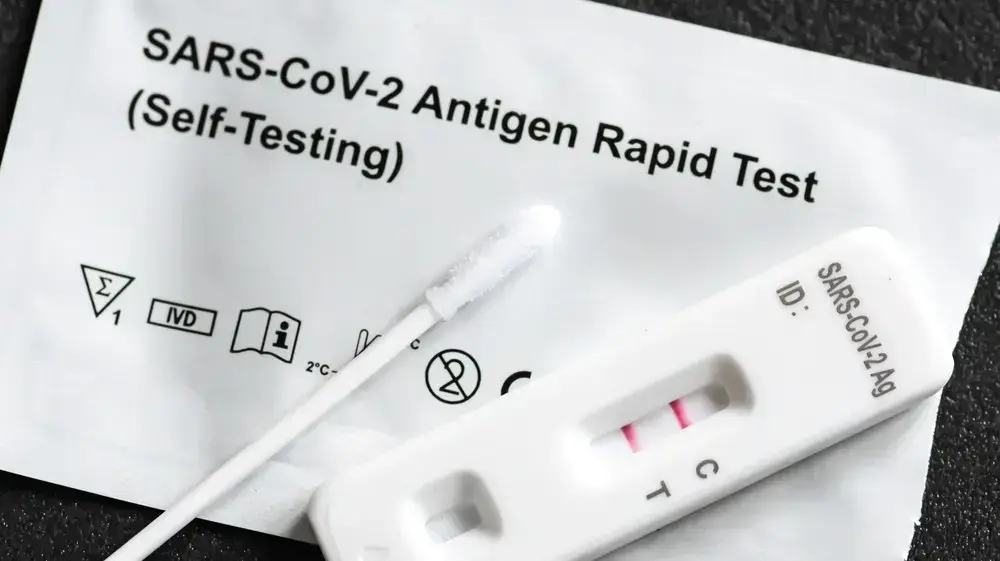Enlarge image
Self-test in class (symbol image)
Photo: Julian Stratenschulte / dpa
Regardless of whether it is about self-tests, masking requirements or distance teaching - the case law in Germany is not entirely uniform on these issues. According to a current decision by the Constitutional Court in Munich, the corona rules for schools are not unconstitutional, at least in Bavaria. The rules in the Free State are similar to the restrictions on school operations that the "Emergency Brakes Act" passed in the Bundestag yesterday provides - but are somewhat more rigid in places.
The judges now rejected an urgent motion against the Bavarian regulations on face-to-face, exchange and distance teaching as well as compulsory tests in schools (Az .: Vf. 26-VII-21), as the court announced.
In the federal state, according to a corresponding ordinance from March, depending on the type of school and year, different requirements apply as to whether schools should offer classroom, alternating or distance lessons:
For example, if there are more than 100 newly infected people per 100,000 inhabitants in a city or a district, pupils from secondary schools are trained in distance learning, as well as grades 1 to 3. For the 4th grades, alternating classes or face-to-face classes with a minimum interval are provided.
From an incidence of 50, the interchangeable model is popular.
Exceptions apply to graduating classes from all types of schools.
Regardless of the incidence, children and adolescents in Bavaria are only allowed to take part in face-to-face classes if they undergo a corona test at least twice a week. There is the possibility of supervised self-tests in the school, but the schools also accept certificates from a test center.
The applicants saw that these regulations violated various basic rights of school children and their families and also violated the principle of equality.
The closure of schools and the referral to digital learning offers have a significant negative impact on personal development.
The children were threatened with health and psychological damage as well as economic disadvantages in their future careers.
In view of the applicant's “subordinate influence of children on the infection process”, this is disproportionate.
more on the subject
School openings in the corona crisis: Between hope and compulsion By Silke Fokken
School operations in the pandemic: Nothing learned? A comment by Miriam Olbrisch
Coalition agreement: all-day entitlement for elementary school children is getting closer
Judges see increased risk without compulsory testing
The Constitutional Court rejected the application on the grounds that the state, as the legislator, has considerable room for maneuver in this regard.
In any case, there was no obvious violation of fundamental rights.
It is true that the restricted school operations lead to high burdens for the schoolchildren and their families: "Nevertheless, in the weighing of the consequences required (in the urgent procedure), the reasons against the issuance of an interim order outweigh the reasons."
Attending school without incidence and without compulsory testing would result in a significantly increased risk of infection for school contact persons, but also for the general population, warned the Constitutional Court.
Children in particular are increasingly affected by the current "dynamic development of the infection process".
Recently there had been greater excitement about legal disputes over corona rules in schools.
Among other things, a family court in Weimar had lifted the mask requirement at two schools in Thuringia.
According to SPIEGEL research, this decision was not made by chance.
A network of radical opponents of the corona policy may have worked towards it.
The Bavarian Ministry of Culture announced on Thursday that the new "Federal Emergency Brake" would not change anything for teaching at schools in the Free State.
There are already requirements here that are stricter than those in the new Infection Protection Act.
Since the number of infections in Bavaria is still very high, these stricter rules continue to apply.
The new Infection Protection Act explicitly allows this.
Lower Saxony, on the other hand, wants to adhere to the "federal emergency brake" - and thus defused its own rules for schools. As decided by the federal government, secondary schools should close from a seven-day incidence of 165 and no longer from a value of 100, said Minister of Education Grant Hendrik Tonne of the "Neue Osnabrücker Zeitung". "Even if I wouldn't have come up with 165 on my own, but if we then make changes, it also makes sense to orientate ourselves towards a uniform national border," said Tonne.
However, the new Infection Protection Act has also met with massive criticism.
The education policy spokesman for the FDP parliamentary group, Thomas Sattelberger, warns that the value 165 is “not a scientifically proven value, but the fatal result of the coalition haggling”.
The SPD and Union completely disregarded the fact that school closings should be the last resort, according to Sattelberger.
It is about the future of our children and grandchildren.
focus














/cloudfront-eu-central-1.images.arcpublishing.com/prisa/S7ERVSCT4FUVX6R7TUVBDNTH5Y.jpg)
